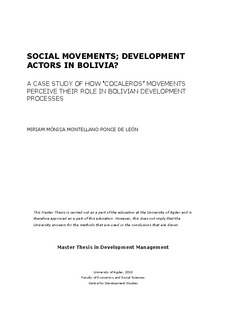Social movements: development actors in Bolivia? : a case study of how "Cocaleros" movements perceive their role in Bolivian development processes
Master thesis
Permanent lenke
http://hdl.handle.net/11250/135167Utgivelsesdato
2010Metadata
Vis full innførselSamlinger
Sammendrag
In the last decades the Bolivian social movements started gaining force and raising their
voices against the injustices and the inefficiency of the governments to give solution to their
problems. During the last 20 years the movements have started to gain control and force, but
many of the movements have a longer history. One of them is the cocaleros movement, the
coca leaf growers’ movement. They spent more than thirty years fighting for what they
considered to be their rights; they practically started form cero and created a strong
organization that represents not only their particular interests, but the collective identity of
their people.
This thesis, based on a six months research among the cocaleros communities, academicians
and civil society shows how this social movement emerged, how it has evolved over time and
how its leaders managed to create perhaps the strongest social movement in the history of
Bolivia. The cocaleros movement was the first social movement that created a ‘political
instrument’ (the political party MAS), a party that won for the second time in the Bolivian
history, with majority, the national presidential elections. As such, the movement has truly
assisted in giving Bolivia its first indigenous president, the former cocalero leader Evo
Morales. This thesis explores how the members of the cocaleros movement perceive their role
in the Bolivian society; how they feel the impacts of their actions have changed Bolivia. The
thesis will also discuss whether they are really changing the Bolivian context or if they are
merely following a political discourse. Finally, the thesis also describes the way this social
movement is seen by other sectors of society, sectors who may or may not agree with the new
government that is somehow closely related to the cocaleros social movement.
Beskrivelse
Masteroppgave development management- Universitetet i Agder 2010
